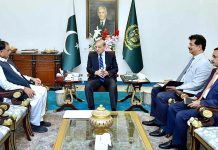
ISLAMABAD, Dec 14 (APP): Ambassador Munir Akram, the Permanent Representative of Pakistan at the United Nations Tuesday called for bridging the digital divide between developed and developing countries, declaring it essential for the global transition.
Ambassador Munir Akram delivered a statement at the First Substantive Session of the Open-ended Working Group (OEWG) on the security in the use of information and communication technologies in the United Nations, says a press release.
“Bridging the digital divide between developed and developing countries is essential for the global transition to modern and efficient national economies and effective international cooperation as well as to enhance the objective of cyber security, said ambassador Munir Akram, during the session.
Ambassador Munir Akram, insisted on the international cooperation for capacity building and sharing of requisite technologies to enhance cyber security in bridging the gaps in capacities and resources among states that “have a significant bearing on the exercise of rights and fulfillment of responsibilities of states in their conduct and use of ICTs for peaceful purposes”.
Speaking about the impact of the exponential proliferation of disinformation, he mentioned “social discord, competing nationalisms, discrimination, hate speech, stigmatization, racism, xenophobia, Islamophobia and related intolerances” which had been further exacerbated by the Covid-19 pandemic and the extreme reliance on ICTs, yielding phenomena from fake cures to anti-vaccine conspiracies. “The virus of disinformation through online platforms and social media has a negative impact on the enjoyment of human rights and fundamental freedoms, erodes the basis for international cooperation, and could pose a threat to international peace and security,” he added.
“The United Nations has a central role in promoting dialogue and international cooperation among the member States to develop a common understanding on all key aspects of the ICT matrix,” he said.
“There is also a need to work with the Department of Communications and other relevant agencies of the Secretariat to counter the proliferation of disinformation. Countering disinformation will require sustained efforts, international cooperation, and multidimensional and multi-stakeholder engagement consistent with international law, including human rights and humanitarian law,” he further said.
Speaking further on the current challenges, he insisted on ensuring the peaceful use of ICTs and preventing cyberspace from becoming a realm of conflict. “The international community must work together to promote cyber security and maintain international peace,” he commented.
He also hoped that the OEWG’s deliberation could help in developing common understandings that could form the basis of future work towards preventing cyberspace from becoming a realm of conflict.
“Appropriate confidence-building measures (CBMs), such as voluntary exchange of information and best practices, can contribute to increasing transparency and predictability in cyberspace and reduce the likelihood of misunderstandings and thus reduce the risk of conflict.”
“Pakistan attaches immense importance to leveraging digital technologies for enabling socio-economic development and facilitating more effective and efficient governance and public service delivery,” he said.
“Pakistan shared the view to develop a legally binding international instrument, specifically tailored to the unique attributes of ICTs, to provide a regulatory framework that creates stability and safety in cyberspace. Such a legal framework should address the concerns and interests of all states, be based on consensus, and promoted within the UN with the equal participation of all states.”
The Pakistan delegation congratulated the Chair, Ambassador Burhan Gafoor, on his election of this open-ended working group and assured Pakistan’s full support and cooperation.
Pakistan also welcomed the adoption of the consensus report by the Open-ended Working Group on Developments in the Field of Information and Telecommunications in the Context of International Security (OEWG) in March this year and called it “a significant and welcome development”. “It reinforces our conviction that global efforts to create a safe, secure, stable, and peaceful ICT-environment can be successful,” Munir Akram said.
The Open-Ended Working Group on the security of and in the use of information and communications technologies 2021-2025 will be holding its first substantive session from Monday, 13 December 2021, to Friday, 17 December 2021.
On 31 December 2020, the General Assembly adopted resolution 75/240 establishing an Open-ended Working Group on the security of and in the use of information and communications technologies 2021–2025.